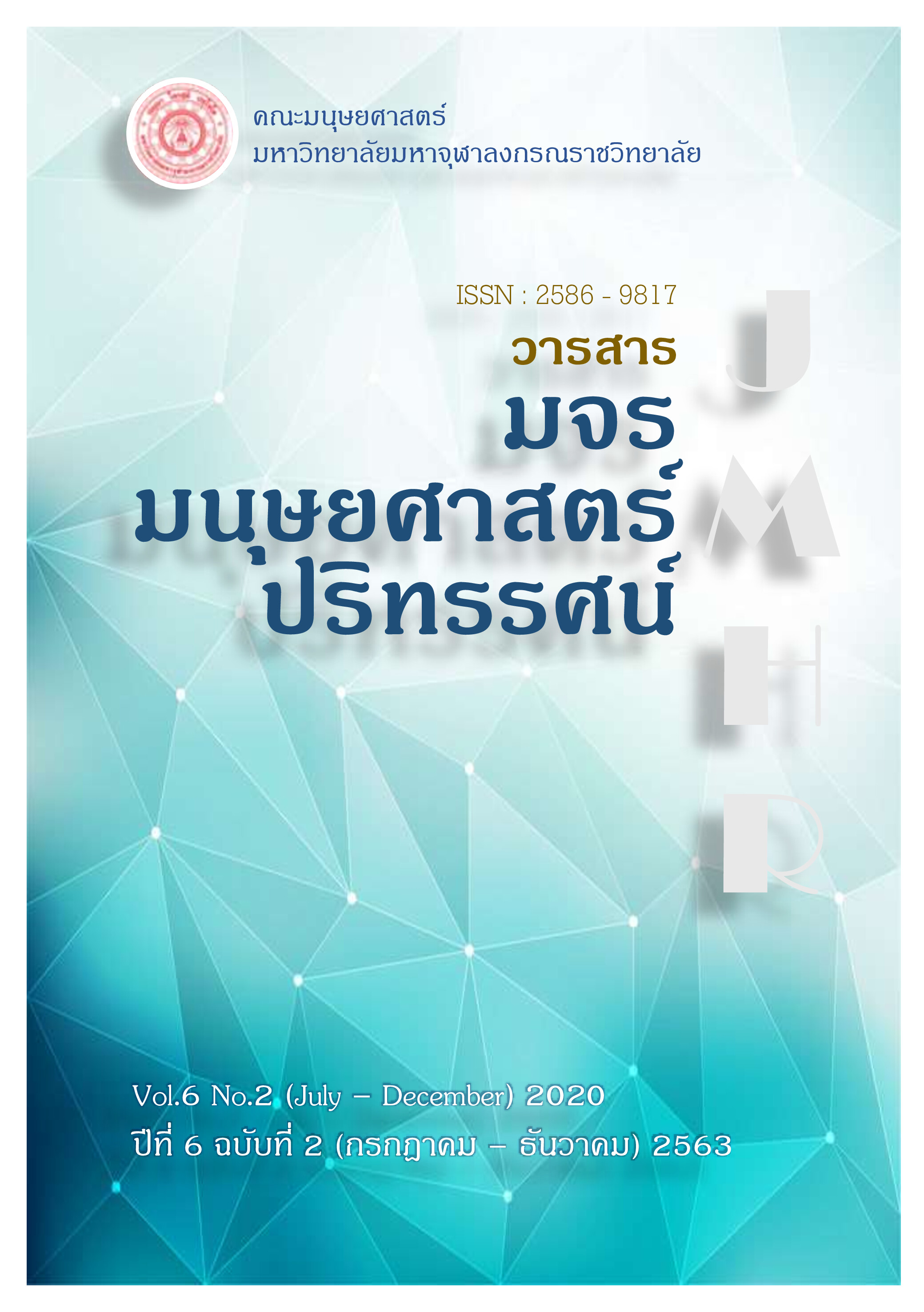โครงสร้างชีวิตวีรบุรุษ “เจงกิสข่าน” ในวิถีวัฒนธรรมประเพณี จากสหบทนวนิยาย “เจงกิสข่าน” ของนักเขียนไทยร่วมสมัย
คำสำคัญ:
เจงกิสข่าน, วีรบุรุษในวัฒนธรรม, วีรบุรุษในประวัติศาสตรบทคัดย่อ
บทความวิจัยนี้มีวัตถุประสงค์เพื่อศึกษาพระราชประวัติจักรพรรดิเจงกิสข่าน ในนวนิยายเรื่อง “เจงกิสข่าน” ของนักเขียนไทยร่วมสมัย จำนวน 3 เล่ม คือ เรื่องเตมูยิน จอมจักรพรรดิเย็นกิสข่าน ของ ประพันธกร เรื่องเจ็งกิ๊ซข่าน ของ สุภา ศิริมานนท์ และเรื่องเจงกิสข่าน ของ “สุริยา” โดยใช้แนวคิดโครงสร้างชีวิตวีรบุรุษทางวัฒนธรรม ของ ลอร์ด แรกแลน การศึกษาพบว่า แม้ผู้เขียนจะเน้นเสนอภาพลักษณ์ของวีรบุรุษในประวัติศาสตร์ แต่ก็มีความสอดคล้องกับโครงสร้างชีวิตวีรบุรุษทางวัฒนธรรมประเพณีด้วย โดยสอดคล้อง 16 เหตุการณ์ เช่น (4) การเกิดของวีรบุรุษมีความแปลกกว่าปกติธรรมดา (6) เมื่อแรกเกิดมักถูกบิดาหรือบุคคลอื่นปองร้าย (8) ได้รับการเลี้ยงดูในฐานะบุตรบุญธรรมในแดนที่ห่างไกล (13) สถาปนาเป็นกษัตริย์ (15) บัญญัติกฎหมาย (22) มีสุสานศักดิ์สิทธิ์หนึ่งแห่งหรือมากกว่าหนึ่งแห่ง ทำให้พระราชประวัติของพระองค์มีความน่าสนใจ เป็นแบบอย่างการต่อสู้เพื่อก้าวพ้นอุปสรรค การพัฒนาตน ความกล้าหาญ ความสามารถในการพัฒนาชาติให้ก้าวหน้า เป็นวีรบุรุษของชาติที่ควรยกย่องอย่างแท้จริง
เอกสารอ้างอิง
กิ่งแก้ว อัตถากร. (2519). คติชนวิทยา. กรุงเทพฯ: หน่วยศึกษานิเทศก์ กรมการฝึกหัดครู.
แคมพ์เบลล์, โจเซฟ และ มอยเยอร์ส, บิลล์. (2551). พลานุภาพแห่งเทพปกรณัม [The Power of myth] (พิมพ์ครั้งที่ 2). (บารนี บุญทรง, ผู้แปล). นนทบุรี: อมรินทร์พริ้นติ้งแอนด์พับลิชชิ่ง. (ต้นฉบับพิมพ์ ปี ค.ศ. 1991)
บารนี บุญทรง. (2552). ชีวิตและคุณูปการของโจเซฟ แคมพ์เบลล์ต่อการศึกษาเทพปกรณัม (วิทยานิพนธ์ปริญญาศิลปศาสตรดุษฎีบัณฑิต). มหาวิทยาลัยนเรศวร. พิษณุโลก.
บุญสมหญิง พลเมืองดี. (2552). สมเด็จพระเจ้าปราสาททอง: ประวัติศาสตร์กับมุมมองทางคติชนวิทยา (วิทยานิพนธ์ปริญญาศิลปศาสตรดุษฎีบัณฑิต). มหาวิทยาลัยนเรศวร. พิษณุโลก.
ประพันธกร. (2507). เตมูยิน จอมจักรพรรดิเย็นกิสข่าน (พิมพ์ครั้งที่ 2). พระนคร: เกษมบรรณกิจ.
สุกัญญา สุจฉายา. (2542). พระร่วง: วีรบุรุษในประวัติศาสตร์และวีรบุรุษทางวัฒนธรรม. วารสารภาษาและวรรณคดีไทย, 16(ธ.ค.), 202-216.
สุกัญญาโสภี ใจกล่ำ. (2562). สมเด็จพระเจ้าตากสินมหาราช: แง่คิดจาก “วีรบุรุษในวัฒนธรรมประเพณี”. วารสารมนุษยศาสตร์ มหาวิทยาลัยนเรศวร, 15(1), 41-54.
สุภา ศิริมานนท์. (2551). เจ็งกิ๊ซข่าน (พิมพ์ครั้งที่ 3). กรุงเทพฯ: แม่คำผาง.
“สุริยา”. (2556). เจงกิสข่าน. กรุงเทพฯ: อักษรโสภณ.
สุริยา รัตนกุล. (2555). พิธีกรรมในศาสนา เล่ม 1 (พิมพ์ครั้งที่ 2). นครปฐม : สำนักพิมพ์มหาวิทยาลัยมหิดล.
อรษา สุวรรณประเทศ. (2552). สมเด็จพระนเรศวรมหาราช: พลังขับเคลื่อนเบื้องหลังประชาชาติ (วิทยานิพนธ์ปริญญาศิลปศาสตรดุษฎีบัณฑิต). มหาวิทยาลัยนเรศวร. พิษณุโลก.
Carswell, T. (1994-2019). Myths, legends and legacy of the Yuan: Genghis Khan and Kublai Khan. China Academic Journal Electronic Publishing House. pp.38-41, Retrieved August 2, 2020, from http://www.cnki.net
Raglan, Lord. (1975). The hero: a study in tradition, myth, and drama. Westport, Conn.: Greenwood Press.
Onon, U. (2005). The Secret History of the Mongols: The Life and Times of Chinggis Khan. Milton Park: Taylor & Francis e-Library.






